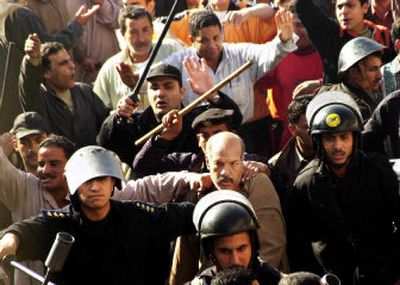Muslim Brotherhood gains seats in election

BEHEIRA, Egypt – The outlawed Muslim Brotherhood captured at least 25 more seats in Egypt’s parliament in a runoff vote Saturday, despite what appeared to be a determined government effort to block its supporters and slow the Islamic-based organization’s building momentum.
Police fired tear gas at several polling places and used rubber bullets at one as residents arrived to cast ballots. In another, a human rights worker reported that police kept out Brotherhood supporters, lifting their cordon only when ruling party supporters showed up in buses at sunset.
President Hosni Mubarak unexpectedly canceled plans to attend a European Union-sponsored summit today in Barcelona, Spain. His spokesman, Suleiman Awwad, said developments in the Arab world were behind the cancellation and denied election unrest was the cause.
The preliminary Interior Ministry figures released early today showed the fundamentalist Brotherhood increasing its share in parliament to at least 72 seats, a more than fourfold jump over its representation in the outgoing parliament – with a third and final stage of voting still to go on Thursday and another runoff likely six days after that.
The outcome, if it becomes final, would give the Brotherhood enough seats to nominate a presidential candidate in 2011 under new constitutional rules.
Despite the Brotherhood’s impressive gains, the ruling National Democratic Party had claimed 122 seats going into the Saturday runoff and was certain to maintain control of the 454-member legislature. New results for the NDP were not available early today since its bloc in parliament also consists of nominally independent members who vote in lockstep with the ruling party.
The vote is seen as a test of the U.S.-allied Mubarak’s pledge to open the country’s authoritarian political system, but the strong showing by the Brotherhood has been followed by violence, unrest and detentions.
Saturday’s runoff was to decide 122 seats in nine provinces where no candidate got more than half the vote in the second round of voting Nov. 20.
Election monitors complained that security forces blocked thousands of the 10 million eligible voters from entering polling stations.
“Voters are being forcefully barred from entering the polling stations (and) many polling stations are empty,” said Negad el-Borai, a monitor and human rights activist.
Interior Ministry spokesman Ibrahim Hammad said no polling centers were closed and denied that police were blocking voters.